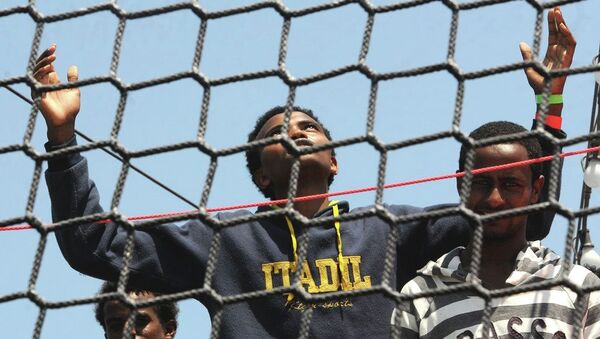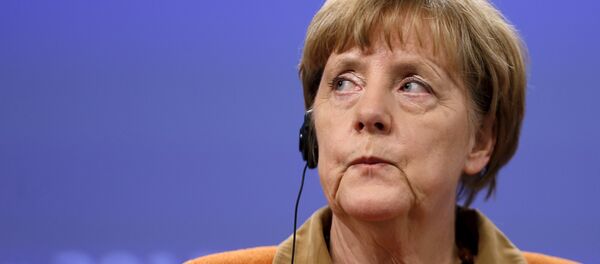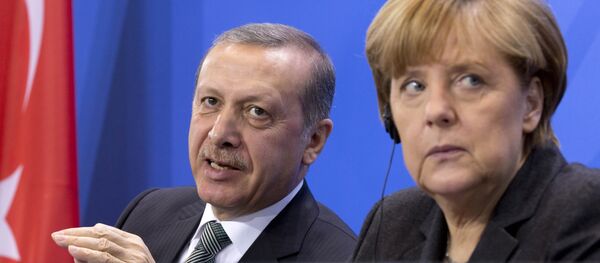The European migrant crisis has exposed cracks within Europe, with many countries shunning the Brussels-backed policy of relocating migrants from Greece and Italy via a mandatory quota system. Moreover, the EU-Turkey migrant deal is looking increasingly shaky, with the UN refugee agency, UNHCR, joining many NGOs, slamming it as being immoral, if not illegal.
"They clearly don't have a grip. It's not just the European institutions, but the European countries who are dealing with the crisis one border at a time. They don't have a grip on the Libya-Italy route," Marta Foresti, Interim Executive Director of the Overseas Development Institute told Sputnik.
"We're seeing a number of countries erecting walls and strengthening border controls around their own territories, largely leading to refugees and migrants seeking alternative routes and trying to enter Europe through the next country down. So we have a domino effect [and] country-by-country operating in a crisis mode to protect their own borders."
#Europe is spending billions on border controls. What does that mean for #refugee & migrant journeys? New animation pic.twitter.com/KeCIKvCnYO
— ODI (@ODIdev) September 16, 2016
The European migrant crisis has been growing for several years, caused by civil wars in the Middle East and Africa. The refugee crisis was exacerbated in 2016, when German Chancellor Angela Merkel declared he country's doors "open" to Syrian refugees, prompting the biggest mass movement of people into Europe since the Second World War.
The exodus saw hundreds of thousands of people risk the dangerous Mediterranean Sea crossing from North Africa to Italy, as well as across the Aegean Sea to Greece. On the land-side, migrants poured through the West Balkan route, causing many countries to erect border controls and fences — throwing the whole EU project into disarray.
In an effort to assist Greece and Italy deal with the mass flow of migrants into their countries, the EU proposed a relocation scheme, whereby refugees given asylum in Greece and Italy would be relocated to other member states, according to a quota system, based on the member states' population and GDP.
However, the system ran into immediate difficulties after many countries — especially in eastern Europe — refused to accept the quota system. As of September 16, 2016, only 4,946 out of the proposed 160,000 migrants have actually been relocated.
The life jackets spread out across Parliament Square are a hugely moving reminder of what's going on in the world. pic.twitter.com/7jFeFX9MUy
— Carl Dinnen (@carldinnen) September 19, 2016
Visiting incredibly moving sea of life jackets in Parliament Square, representing refugees who died #withrefugees pic.twitter.com/LRTaM9FWRM
— Jonathan Bartley (@jon_bartley) September 19, 2016
Dodgy Deal With Ankara
Meanwhile, in an effort to stem the flow of migrants crossing from Turkey into Europe, the EU brokered a deal with Turkey under which the EU is due to pay Turkey — initially — US$3.95 billion to bolster its refugee camps and accept "irregular" migrants denied asylum in Greece in return — on a one-for-one basis — for Syrian refugees in Turkey being relocated in the EU.
However, many NGOs — including Medecins Sans Frontieres, the International Rescue Committee, the Norwegian Refugee Council, Save the Children and Red Cross — have joined the UN refugee agency UNHCR as saying the EU-Turkey deal is either immoral or illegal as the 'hotspots' have become detention centers. They also say Turkey is not a 'safe country' for migrants to be returned to, under the Geneva Convention.
As part of the deal, Turkey demanded that its citizens be given visa-free access to the EU Schengen zone and the acceleration of Turkey's accession into the EU. However, talks have stumbled over Turkey's human rights record and suppression of opposition to the Turkish Government.
Common sense: safe and legal routes the only way to manage migration and displacement. #UN4RefugeesMigrants
— Marta Foresti (@martaforesti) September 19, 2016
"The question about whether Turkey is a safe country to return to was a controversy when the deal was first signed. The Greek government has passed a law that declared that Turkey was a 'safe country'. But the problem with the deal is that, politically, it is not likely to hold. The Turkish government is very clear that the key thing it want in return for the deal is visa-free travel for its citizens in Europe… and that doesn't look likely after the coup," Foresti told Sputnik.
As world leaders and their representatives gather at UN headquarters in New York for what is describes as a "watershed moment," many will be asking what hope there is for the million and more displaced people currently scattered across Europe amid growing divisions over how to deal with them.




